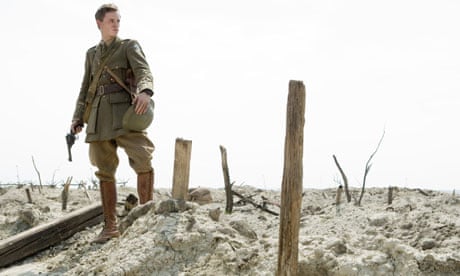A man with a tin helmet and a faraway empty look stands amid the madness, the mud, and the misery of the western front, northern France, 1916. Suddenly the screen brightens, comes alive. There are trees, leaves, water, light, elegantly dressed women and chortling pheasants. We're still in northern France, just a few miles from where we were before, but we've gone back in time, to 1910. The same man is there, no helmet, younger and more focused, less tarnished.
That's how it goes in Birdsong (BBC1, Sunday); we yo-yo backwards and forwards between Claude Monet and Siegfried Sassoon. The war scenes are extraordinary – a meticulous portrayal of life in the trenches. Perhaps you don't get as great a sense of the scale of what's going on as you might have done if Sebastian Faulks's novel had been given the big-screen, multi-million dollar Hollywood treatment. But this adaptation by Abi Morgan has the detail – the terror and the tedium. And, a sort of hell beyond hell, the terrible tunnels dug under the trenches that could – and did – fill with water at any time if a mud wall was breached. Or fill with Germans, so close did they go to the enemy's own tunnels.
Eddie Redmayne is an excellent Lieutenant Stephen Wraysford, the man with the tin helmet and the faraway look. Complicated, lonely, not especially likable nor especially liked by his men or his superiors, his whole focus in the war scenes is on the other time before the war. Now he is an empty shell, living only on memories.
He's good in the early prewar scenes too, though at first he only really has to be posh and pretty (not hard for Redmayne, I'd have thought). Actually he says very little throughout, it's really about that look – not staring into the middle distance here, but staring longingly at his host's wife, Isabelle (Clémence Poésy), who is trapped in a hollow loveless marriage. Longing, then lust which, when reciprocated, soon reaches simmering point.
The atmosphere is stifling and highly charged. Poésy doesn't say much either, she stares back at Redmayne, wide-eyed and catlike. There's actually something feline about both of them, beautiful, silky, aristocratic cats, longing to get their claws into each other – in a good way. Well, good unless you're Isabelle's bullying husband, René (Laurent Lafitte, also fabulous, very nearly steals the show; well at least he says something).
Anyway, Redmayne and Poésy are perfect together, they're credible, they fit – emotionally and physically. I remember finding the sex in the book awkward; here it seems natural, right. And very sexy. [Exhales, wipes brow.]
While the younger Redmayne becomes more and more alive, the opposite is happening to his older self in the trenches. Death and devastation close in from all sides, like the collapsing walls of the tunnels he now has to work in. The contrast between the two settings gets wider and wider, and more and more dramatic as we jump between the two.
It's not fast: this is trench warfare, not a quick raid. But it gradually builds up to an intensity and power that takes hold of you. Both the war, and the love. This adaptation, which concludes next Sunday, has been an awful long time coming – there's been talk of filming Birdsong since the novel was published almost 20 years ago. But I think this is worth the wait.
You'll probably know affable long- haired archaeologist Neil Oliver from Coast. Here, in The Last Explorers (BBC2, Sunday), he has traded the white cliffs and windy beaches of the outside of Britain for the heat and the vastness of the inside of Africa. Just as the presumptuous Sir Henry Morton Stanley did more than 140 years ago, Oliver is off in search of a fellow Scot, Dr Livingstone. Well, his story anyway.
It's a fascinating one, of a fascinating man. David Livingstone wasn't simply a blundering colonialist missionary with a bible in his hand and a pith helmet on his head; he was a reformer and a passionate anti-slavery campaigner. He was also a complicated man, who often misjudged situations and took optimism to the point of delusion.
Livingstone's reputation took several severe bashings. It was actually only after Stanley found him, and reported back, that his reputation was in some way restored and his legacy cemented. The only pity is that Stanley probably never actually said those famous words. That's disappointing. Next they'll be telling us that Sherlock Holmes never actually said: "Elementary, my dear Watson."

Comments (…)
Sign in or create your Guardian account to join the discussion